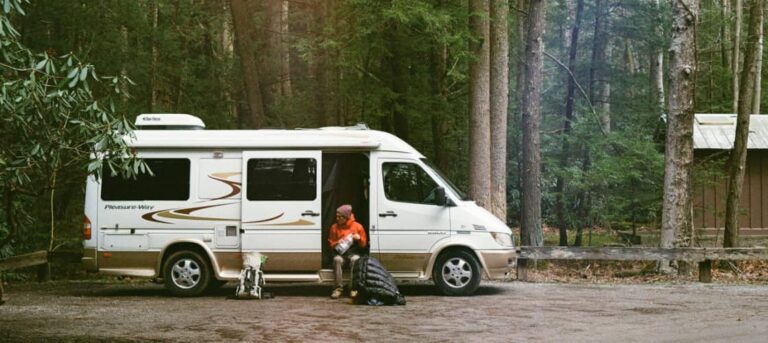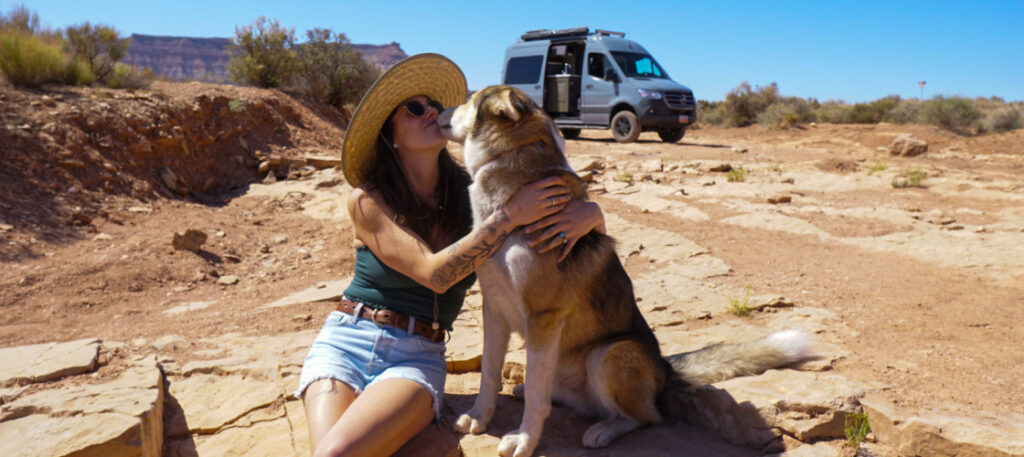
Class B RVs are a low-profile way to bring the comforts of home on the road. They can reach areas that larger rigs aren’t able to go, and they’re easier to drive. Because of their smaller size, they also get better gas mileage and can go faster on the road. These vans are sometimes known as sleeper vans or camper vans.
Whether you’re a solo adventurer, a cozy couple, or a small family, Class B motorhomes have a lot to offer. We’ll do a deep dive into everything you need to know about these unique vehicles!
Class B RVs: What You Need to Know
Travelers who drive Class B RVs love that these vehicles are easy to drive. Class Bs can go pretty much anywhere a normal van can go. They can often wind their way into remote areas that bigger motorhomes and trailers can’t manage. And some camper vans are surprisingly spacious.
You won’t need to tow a vehicle behind you, because you can use your Class B camper for day trips and bring it back to camp for the night.
It’s easier to see and navigate your vehicle when driving a Class B camper. And a small Class B RV is not nearly as challenging to drive in windy conditions. You’ll get much better gas mileage in a campervan as well!
Class B Camper Amenities
Unlike Class A and Class C rigs, Class Bs are able to pack a lot of creature comforts into a small space. Some Class B RVs have extended ceilings so you can stand up straight while inside the rig.
Although their size is pretty consistent, Class B RVs come with a wide variety of different features. A number of manufacturers make these vans, and they have a range of prices.
A sub-class known as “Super B” or “B+” is a hybrid between a Class B and Class C motorhome. These “B+” vehicles may offer more headroom, storage, and living space. But they still keep most of the benefits of a small RV including fuel efficiency and ease of use.
Class B RVs can sleep a surprising number of passengers in their small vans. Regular Class Bs often have sleeping spaces for as many as four adults. B+ or “Super B”s may sleep as many as six.
Class B specifications
| Category | Class B Motorhomes |
| Size | 16-19 feet; sometimes with extended ceilings or extra length (Class B+) |
| Weight | 6,000 to 8,000 pounds |
| Mileage | 10-25 miles per gallon |
| Storage | Limited to moderate |
| Sleeping Capability | 2-4 adults; up to 6 in the case of Class B+ |
| Extra Amenities | Slide-outs, wet/dry bathroom compartments with showers, limited kitchenette facilities, leather sofas and sleeping surfaces, onboard plumbing facilities, generator |
| Price Range | $40,000-$80,000+ new |
Despite their small size, Class B RVs offer some incredible luxuries. Many models come complete with fully-functioning kitchenettes, toilets, and even showers. Showers may be built into a multi-use wet bathroom, which means your toilet and shower share a space.
Because space is at a premium, almost everything inside your Class B motorhome will serve at least two functions. Your sleeping area may be a couch during the day, and your dining area may fold out into a bed. And while a Class B RV may have kitchen appliances, you’re unlikely to find one equipped with a full-sized refrigerator, oven, or stove.
High-end Class Bs come equipped with all the basics for getting off the grid, such as fresh- and waste-water holding tanks and generators. In addition, they occasionally feature slide-outs to make their living spaces more comfortable. Many Class B sprinters come with high-quality amenities like all-electric features, great sound systems, genuine leather upholstery, cushy bucket seats, modern chrome kitchen features, and more.
These rigs are well suited to dispersed camping, since they’re small and easy to maneuver into wilderness areas. They’re also easy to wire for solar since they don’t need to draw very much power.
Class B RV Makes and Models
Class Bs come from many different manufacturers, and the class also includes converted vans originally built as regular passenger vans. A few of these RV manufacturers include:
- Airstream
- Coachmen
- Forest River
- Winnebago
You may hear Class Bs referred to by the following terms: sprinter vans, camper vans, and sleeper vans.
Each of these generally refers to the same kind of vehicle, though sprinters are a specific brand that is built on a Mercedes-Benz sprinter van chassis. Mercedes sprinters are among the most famous models of Class B RVs.
Mercedes-Benz Sprinter Vans
Mercedes Sprinter vans are made from luxury conversion vans, or stock vans that are sent to third-party companies to be outfitted for road trips.
Although Mercedes isn’t as well-known of a camping brand, their campervans are nonetheless a force to be reckoned with. Sprinters have high-quality engines and are stocked with some of the most luxurious amenities in the business. They can also sell for upwards of $100k+, despite their small size. They’re considered one of the best Class B RV models available and come in two or four-door styles.
VW Campervans
The Volkswagen (VW) Type II campervan is perhaps the most iconic RV ever made. The VW campervan, also known as the “hippie van,” was popularized by counterculture celebrities after WWII. Despite its association with beatniks and hippies, the VW campervan also endeared itself to millions of families thanks to its industry-leading design, focus on comfort, and the availability of budget-friendly options.
Though the last production run of the VW Type II ended in December 2013, there is still demand for VW campervans among RVers. All VW campervan models, from combi vans to microbuses to Westfalia campers, feature similar retro styling inspired by the early luxury trams of Europe.
Conversion Vans
Conversion vans, which are Class B RVs, are vans that have been converted to function as campers. Whether it’s a luxury conversion van rental or a DIY job, you’ll be traveling with all the amenities of a basic RV. These days, people make conversion vans from a variety of vehicles, like box trucks, vintage buses, and church vans.
Class B Motorhome Rental

If you’re seriously considering purchasing a Class B RV, you’ll want to explore as many different types and styles as possible. That way, you’ll have an understanding of which kinds of rigs fit your camping style and preferences.
One suggestion for campers looking to purchase an RV of their own is to attend an RV show. This gives them the opportunity to walk through a number of rigs and meet RV dealers in the area. They can get a sense of the types of RV they may want, as well as which dealerships they feel most comfortable with.
However, even the best walkthrough in the world doesn’t get you the kind of insight that taking an actual camping trip in your prospective RV style does. If you’re interested in buying a Class B camper, renting one to test it out first is a great idea!
If you rent a Class B campervan with RVshare, you can determine if sleeping in a van is a good vacation (or full-time) lifestyle for you. Although it’s fun and adventurous, taking a road trip in a van isn’t for everyone. By renting a camping van instead of buying, if it turns out not to be your perfect means of travel, no problem! You can return it and maybe rent a bigger RV next time instead.
Tips On Renting A Class B Van
Here are some things to know if you’ll be renting a Class B RV:
- Check it out before renting
- Budget for gas
- Pack light
- Consider what you can move outdoors
- Allow plenty of time for setup
- Practice driving
Check it out before renting
Make sure the RV you’re considering has good reviews. You can check reviews on the RV listing or even contact the owner if you have specific questions. When you do a walk-thru before driving off, make sure all of its mechanical parts are in good working order. Do a thorough walk-around with the renting owner to avoid charges for damages that aren’t your fault. Make sure you understand exactly what fees you’re responsible for. Fees for insurance, extra mileage, or even additional passengers can make the bottom line higher than you initially expected.
Budget for gas
Class B RVs get much better gas mileage than their larger counterparts like Class A and Class C campers. Some newer, lightweight vans can get as much as 25 miles to the gallon. Even lower gas mileage vans can usually get 10-12 miles to the gallon.
Pack light
You’ll find that space is still scarce in a Class B campervan, even though they can fit a lot more inside than you might think. You’ll want to pack carefully and avoid bringing a lot of extra stuff you won’t need. Think about what you’ll actually need – you may even want to make up a packing list to make sure you don’t toss in too many extras.
Consider what you can move outdoors
If you’re traveling with others, you may want to move as many of your camping activities outdoors as possible to avoid crowding. Consider cooking on a camp stove on a nearby picnic table, or cook over a campfire. Set up camp chairs and an area outside where you can relax. The more you can keep people outside during the day, the less crowded your campervan will feel and the cleaner it will stay.
Allow plenty of time for setup
Setting up a campervan is certainly easier than setting up a larger RV. However, there are still some things you’ll need to do. You may want to level your van when you arrive. If your van doesn’t have a kitchen inside, you’ll need to set up your cooking area. You’ll also need to unpack and pull out the things you’ll need while you camp. The first few times you camp in a Class B van, plan to arrive at your campsite with several hours of daylight left so you can see easily as you set up.
Practice driving
Campervans are much easier to maneuver than larger rigs. But many of them are still bigger than most standard vehicles. You’ll want to drive around a bit and get a feel for your campervan before heading on a longer trip, especially if it’s a taller model.
Class B RVs are a wonderful way to explore the world! With a little research, you can find one that will suit you and your lifestyle just right.

